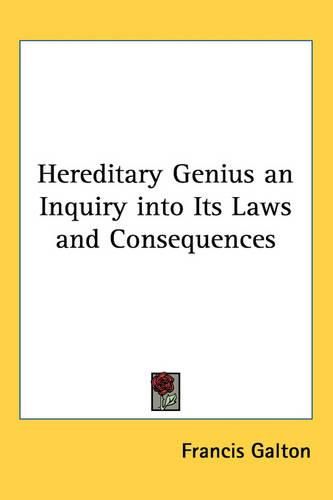Readings Newsletter
Become a Readings Member to make your shopping experience even easier.
Sign in or sign up for free!
You’re not far away from qualifying for FREE standard shipping within Australia
You’ve qualified for FREE standard shipping within Australia
The cart is loading…






Published in 1869, by Galton, an explorer and anthropologist, known for his pioneering studies of human intelligence. Influenced by the work of his cousin Charles Darwin, he coined the term eugenics (from the Greek eugenes or wellborn) and devoted the latter part of life to applying Darwinian science to develop theories about heredity and good or noble birth. In this volume he makes the case for his theory of hereditary genius. The contents include: classification of men according to their reputation; classification of men according to their natural gifts; comparison of the two classifications; notation; the judges of England between 1660 and 1865; statesmen; english peerages, their influence upon race; commanders; literary men; men of science; poets; musicians; painters; divines; senior classics of cambridge; oarsmen; wrestlers of the North Country; comparison of results; the comparative worth of different races; and the influences that affect the natural ability of nations.
$9.00 standard shipping within Australia
FREE standard shipping within Australia for orders over $100.00
Express & International shipping calculated at checkout
Published in 1869, by Galton, an explorer and anthropologist, known for his pioneering studies of human intelligence. Influenced by the work of his cousin Charles Darwin, he coined the term eugenics (from the Greek eugenes or wellborn) and devoted the latter part of life to applying Darwinian science to develop theories about heredity and good or noble birth. In this volume he makes the case for his theory of hereditary genius. The contents include: classification of men according to their reputation; classification of men according to their natural gifts; comparison of the two classifications; notation; the judges of England between 1660 and 1865; statesmen; english peerages, their influence upon race; commanders; literary men; men of science; poets; musicians; painters; divines; senior classics of cambridge; oarsmen; wrestlers of the North Country; comparison of results; the comparative worth of different races; and the influences that affect the natural ability of nations.